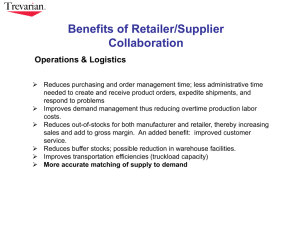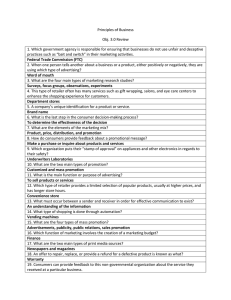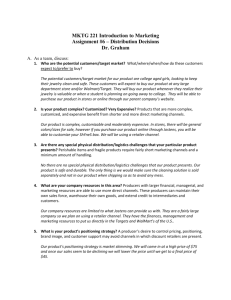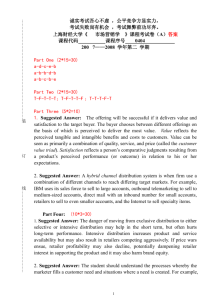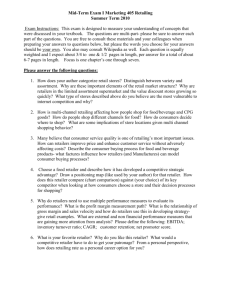Essential Services Commission`s Energy Retailer Contract Variation
advertisement
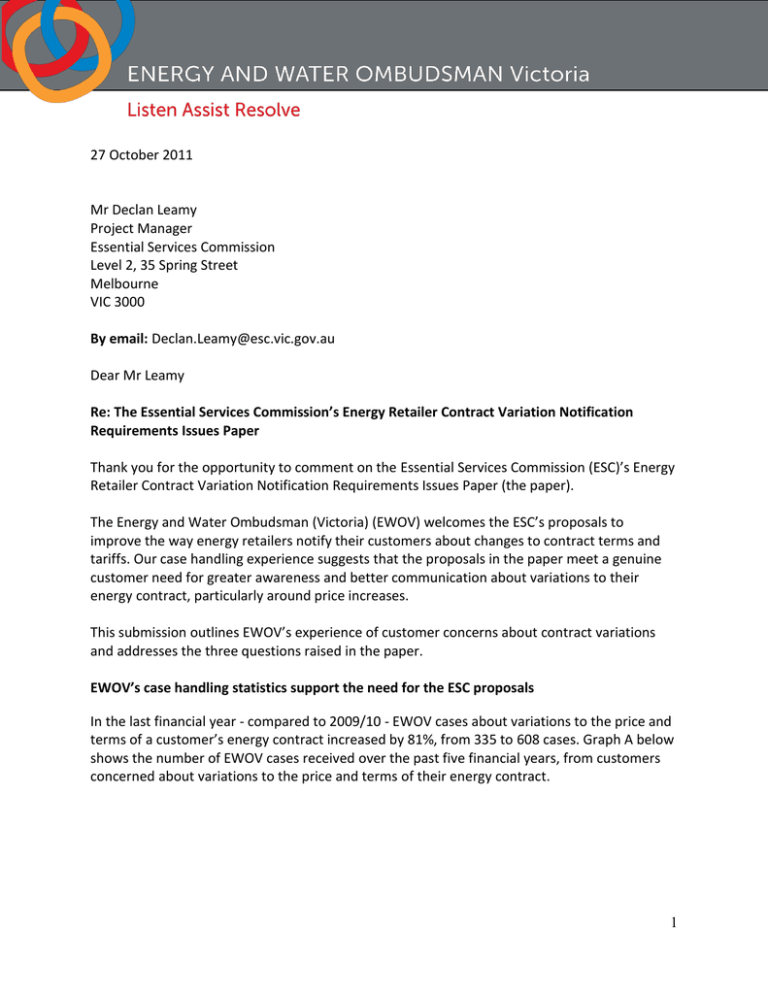
27 October 2011 Mr Declan Leamy Project Manager Essential Services Commission Level 2, 35 Spring Street Melbourne VIC 3000 By email: Declan.Leamy@esc.vic.gov.au Dear Mr Leamy Re: The Essential Services Commission’s Energy Retailer Contract Variation Notification Requirements Issues Paper Thank you for the opportunity to comment on the Essential Services Commission (ESC)’s Energy Retailer Contract Variation Notification Requirements Issues Paper (the paper). The Energy and Water Ombudsman (Victoria) (EWOV) welcomes the ESC’s proposals to improve the way energy retailers notify their customers about changes to contract terms and tariffs. Our case handling experience suggests that the proposals in the paper meet a genuine customer need for greater awareness and better communication about variations to their energy contract, particularly around price increases. This submission outlines EWOV’s experience of customer concerns about contract variations and addresses the three questions raised in the paper. EWOV’s case handling statistics support the need for the ESC proposals In the last financial year - compared to 2009/10 - EWOV cases about variations to the price and terms of a customer’s energy contract increased by 81%, from 335 to 608 cases. Graph A below shows the number of EWOV cases received over the past five financial years, from customers concerned about variations to the price and terms of their energy contract. 1 Graph A - Number of EWOV cases about variations to the price and terms of an energy contract 800 Number of cases 700 608 600 500 400 335 300 271 200 130 100 0 59 2006/07 2007/08 2008/09 Financial year 2009/10 2010/11 In the last financial year - compared to 2009/10 - EWOV cases about energy price increases grew by 53%, from 483 to 737 cases. Graph B below shows the number of EWOV cases received over the past five financial years, from customers concerned about energy price increases. Graph B - Number of EWOV cases about energy price increases 800 737 Number of cases 700 600 500 483 400 371 300 200 100 0 164 74 2006/07 2007/08 2008/09 Financial year 2009/10 2010/11 EWOV case data clearly suggests that customers are increasingly concerned about energy price increases and variations to the terms of their contract. EWOV therefore welcomes the ESC’s proposal to better notify customers of contract changes, which will increase their awareness that retailers can increase prices during a market contract period. 2 The questions posed in the paper A separate action confirming the customer’s explicit informed consent to future contract and tariff variations should be recorded in writing, over the phone or electronically at the point of sale. This action should be in addition to the customer’s general acceptance of the other contractual terms and conditions at any time. The Commission seeks comments on these matters including how they may be practically implemented. Current retailer sales practice involves a ‘sales verification’ call between a new customer and the sales agent, during which the new customer is asked a series of questions requiring a ‘yes’ or ‘no’ answer. It is assumed that a ‘yes’ response to a question sufficiently equates to the new customer giving their explicit informed consent to the proposition. While this process is practical and mostly effective, there are individual customer circumstances where explicit informed consent to the terms of the contract cannot be presumed with certainty - language difficulties, intellectual capacities, age, disability, disinterest, mental illness, levels of understanding and literacy are all possible factors in consent not being properly given. EWOV understands that most, if not all, sales verification calls must include a question asking whether the new customer agrees to the retailer varying the terms of the market contract1. In listening to a sample of sales verification recordings received from retailers during the course of our investigations, we found that the questions asked are considerably different between retailers. Below are some examples that illustrate this inconsistency: If these rates change we will notify you in writing no later than your next energy account. (C/2011/16901) Do you give your explicit informed consent to Retailer X being able to vary your energy charges? (G/2011/1553) Please be aware that we may change our standard business rates during the term. We might do this, for example, to reflect the cost we incur when selling you energy. We would like to give you notice of any change in writing, such as in your bill. Okay? (C/2011/1509) We vary the rates and other charges under this contract and you will be given notice of any changes in writing. (C/2011/8370) Some customers contact us because they did not realise or understand at the point of sale that they had agreed to their new retailer increasing energy prices during the term of the fixed contract. As illustrated in Graph A above, in the last financial year EWOV received 608 cases where customers complained about their provider varying the terms of their contract, often relating to a price increase. 1 Section 20 of the Energy Retail Code - Variations Require Customer’s Agreement. 3 The below case study is indicative of a common customer experience with this issue: C/2011/4529 Investigated complaint received on 14 February 2011 and closed on 9 March 2011. Customer statement The customer was dissatisfied because after transferring to Retailer X her first bill was based on a tariff rate higher than that which she agreed to when approached by a marketing representative. On 29 October 2010, the customer received a telemarketing call from a Retailer X representative and agreed to transfer her electricity supply. The customer is elderly and her property is registered as having life support equipment. Her son handles most of her affairs. In mid January 2011, she received her first Retailer X electricity bill and discovered that she was billed on a higher tariff rate than that quoted to her and agreed to at the time of marketing. This was verified when her son compared the tariff rate on the bill to the rate listed on her contract. The son contacted Retailer X on about three occasions to seek an explanation for the price increase, and after being dissatisfied with the response, contacted EWOV. To resolve the matter, the customer wanted to be returned to her previous energy retailer without financial penalty. EWOV’s investigation looked at the Retailer X contract terms, the reasons for the price increase on the customer’s first bill and the integrity of the customer’s consent to future price increases. Resolution Retailer X explained that there was a price increase on 1 January 2011, which was before the customer received her first bill. Accordingly, the tariff rate on the first bill was more than the rate quoted during the telemarketing call of 29 October 2010. It transferred the customer’s electricity supply back to her previous retailer without applying a termination fee and closed the customer’s account with a zero balance. Retailer X provided a direct contact person for the customer and her son to call should they have any further queries. EWOV suggests that the ESC consider the following approach to tackle this issue so that customers are better informed about the ability of a retailer to vary contract terms: The ESC should develop a mandatory script followed by all retailers, to ensure that the sales verification questions are asked in clear and plain English. For example, ‘Do you understand that we can increase the price you pay at any time after you agree to this contract?’ EWOV supports the ESC’s suggestion of requiring a retailer to make a separate and further action to help a customer better understand how it can vary contract terms. This is best achieved when the marketer clearly explains to the new customer why the 4 signature is needed and when the contract document contains easily understandable and visible written information about the further consent. The retailers’ Offer Summary and Price and Product Information Statement should contain a warning notice clearly explaining that by signing the contract, the customer agrees to future contract variations, including price increases. A notice is more visible when it is within a text box with a different font and highlighted in some way. The ESC - and from 1 July 2012, the Australian Energy Regulator (AER) - should play a role in educating customers about these contract variation terms. Customers can be made aware through the ESC’s ‘Your Choice’ website portal, the AER’s price comparison website and other information avenues. All customers with accumulation meters should be given at least 20 business days prior notice of any tariff variation. The Commission seeks comments on this matter. If the rationale for having this provision about advanced meters in the Energy Retail Code is to notify customers of imminent price increases so that they are better informed consumers in the retail energy market, then it follows that this consideration should apply to all Victorian customers regardless of meter type. It would also benefit the industry by providing a standard process that is more easily incorporated into a retailer billing system, rather than having two separate notification processes based on a customer’s meter type. A retailer should not be permitted to rely on the customer’s general acceptance of all terms and conditions when seeking to subsequently amend a term or condition. Retailers should not be permitted to vary the terms and conditions of a fixed term or fixed price market contract within the first twelve months or for the term of the contract if less than twelve months. The Commission seeks comments on this matter. Currently under most market contracts a retailer may increase a tariff rate without notice to a customer even before the customer receives their first bill - this is illustrated in the EWOV case study on page 4. This may lead to customers claiming misleading marketing behavior or a breach of agreed contract terms. This happens as a consequence of a customer not understanding that they gave consent at the point of sale for the retailer to vary the terms of their contract, including the price. The ESC’s proposal for a freeze on increasing a tariff rate during the first 12 months of the contract will have benefits for customers. Knowing that the tariff rate is fixed for 12 months will give customers more concrete information to help them compare available retailer offers. Customers will be certain that they will not be subject to an early price increase, yet retailers can still secure customers by having 5 contract termination fees. This will lead to better informed consumer choices, and may increase customer confidence in the energy market. We trust that the above comments are helpful. Should you require further information or have any queries, please contact Justin Stokes, Senior Research and Communications Officer on (03) 8672 4272. Yours sincerely Fiona McLeod Energy and Water Ombudsman (Victoria) 6
